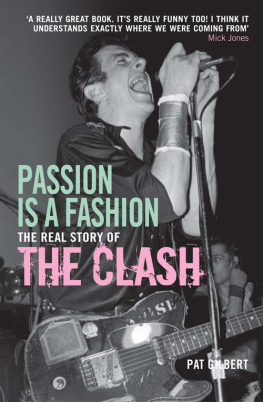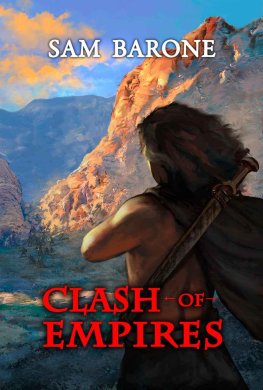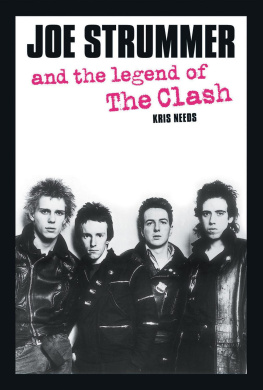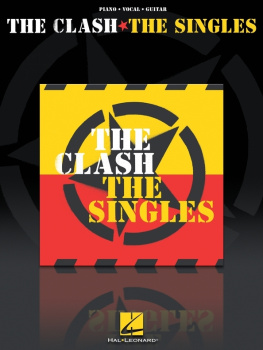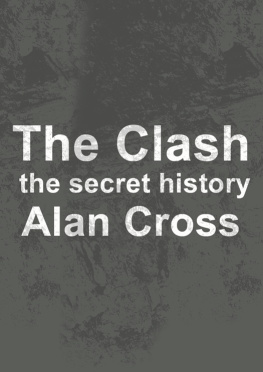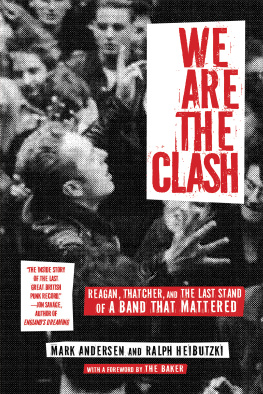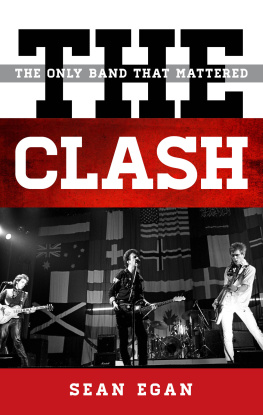
Pat Gilbert is a former editor of MOJO, the bestselling and internationally acclaimed music magazine. He has also contributed to Q magazine, the Guardian, The Times and the Sunday Times, and has produced radio programmes for the BBC. His new book, Shout It!, on the legendary TV series The Sweeney, is published by Aurum in 2010.
Impressively exhaustive New Statesman
What makes this book so special are the intimate, candid interviews with the friends, fellow musicians, hangers-on and, of course, the four members of the group themselves MOJO
The closest youll get to a definitive history of the band Sun
A truly great band deserves a truly great account of them to be given. And thats what the Clash have got Tribune
I thought Pat Gilberts book about The Clash, Passion Is A Fashion, was genius. I thought it recreated those days when youd get your head kicked in for wearing your dads winkle-pickers brilliantly Ian Brown
First rate, written with a vigour and verve that its subject matter would surely appreciate Mojo
To my father:
Lewis Frederick Gilbert 193099
Nothing great in the world has ever been accomplished without passion.
Georg Wilhelm Friedrich Hegel
T HIS BOOK WOULDNT have been written without the encouragement of John Broad, who picked me up when I was down, dusted me off and inspired me to think like a writer. I can never thank you enough. Id also like to extend a warm double handshake to Robin, who, once Id been picked up and dusted off, has consistently stopped me from falling down again.
Hayley and Luis I love you, my darlings, youre allowed back into The Bunker now.
Many thanks to Graham Coster at Aurum and Celia Hayley at LAW, who believed in me, guided me, and made lots of encouraging noises which were a lifeline. Just as important were Mark Paytress and John Reed who gave me lots of practical advice and lent a sympathetic ear, managing editor Phoebe Clapham for her eagle-eyed attention to detail, and Rachel Leyshon, copy-editor extraordinaire, who deftly trimmed some rioja-fuelled excesses in the original manuscript and made many judicious nips and tucks.
Passion Is A Fashion wouldnt exist, either, without the sterling research and Clash knowledge of Steve Kirk and Graham Jones, whose info site, www.blackmarketclash.com, is peerless as an authority on gigs, set-lists and recordings.
Im also deeply indebted to Jon Savage, the author of the acclaimed and essential Sex Pistols biography Englands Dreaming (Faber), who gave me an unpublished interview with Joe. Thanks, Jon. Equally generous were the legendary Fred Dellar, who loaned me his comprehensive archive of Clash cuttings, and Jon Bennett, who gave me some extra Clash interview material. Cheers also to Anthony Davie, who allowed me to use a great anecdote from his excellent book on Joe Strummer and The Mescaleros, Vision of a Homeland.
A big thank you, too, to Tricia Ronane, who arranged access toThe Clash for MOJO features and other projects. Then theres the crack team of transcribers who worked under enormous pressure to do an amazing job: thank you Kathy Bacon, Sheila Gilbert and Ben Hawkes.
Ive been stunned by the kindliness and generosity of all those whove helped me, however much or little, and sometimes possibly without realising it. In no particular order, a big thanks to:
Chris Knowles, Sean Anderson (ASCAP), Ian Wallace, Andy Neill, Andy Davis, Sophie Williams, Jeanette Lea, Chris Butler, Piers Gormley, Chris Reynolds, Jeff Dexter, Tami (strummernews.com), Paul Gorman, Tony Byrne, Paolo Hewitt, Terry Rawlings, Roger Armstrong, Steve Mumford, Mat Snow, Paul Trynka, Phil Alexander, Wag, Andrew Male, Jenny Bulley, Ian Harrison, Geoff Brown, Matt Turner, Felice from Byam Shaw, Don Whistance (www.theclash.org.uk), Johnny Rogan, Planko, Manchester Kev, Stuart Williams, George Binette, Chris Salewicz, Richard Jobes, Chris Hunt, Gigi Corcoran and Phil Savill at Sony, Tom Vague, Lloyd Bradley, Nicola Joss, Matt Kent, Craig Riddington, Lois Wilson, Nardia Plumridge, Dean Rudland, Neil and Dave at Ace, Jane Titterington, Richard Jenkins, Russ Burton, Gary Pitt, Simon Griffin, Damian Steward, Alan Parker, Welsh Pete, Nickie Shield, Pockets, Paul Burgess, Peter Dogget, Jean Whelan, Roger Goodman, Bob Morris, Paul Hallam, Daryl Easlea, Tony Linkin, Paul Lewis, Nicky Demuth, Lucinda Mellor.
Then there are the interviewees and real stars of this book: thanks for your time and patience. Several were originally interviewed for the MOJO features and other articles that became the foundations of Passion Is A Fashion; most were specifically interviewed for the book itself.
Joe Strummer (God bless you), Mick Jones, Paul Simonon, Topper Headon, Bernie Rhodes, Kosmo Vinyl, Pete Townshend, Bob Gruen, Caroline Coon, Jack Hazan, Joe Ely, Johnny Green, Nick Sheppard, Pennie Smith, Peter Jenner, Sandy Pearlman, Simon Humphrey, Terry Chimes, Tony James, Robin Banks, Ray Gange, Steve Connolly aka Roadent, Glen Matlock, Glyn Johns, Micky Gallagher, Miky Campbell, Roger Armstrong, Tymon Dogg, Frank Zanhorn, Wiggy, Jock Scot, Andrew King, Ivan Julian, Rick Rubin, Susan Blond, Howie Klein, Howard Fraser, Barry Myers, Michael Bradley, Alex Michon, Sebastian Conran, Pearl Harbour, Rudi Fernandez, Jiving Alan Jones, John Brown, Richard Dudanski, Mark Perry, Jon Savage, John Tiberi, Micky Foote, Jean-Jacques Burnel, Dennis Morris, Dave Goodman, Simon Cowell, Ken Powell, Chris Reynolds, Digby Cleaver, Don Letts, Pete Howard, Bill Price, Tony Whelan, John Pearse, Jeff Dexter, Johnny Black, Kit Buckler, Vic Godard, Ray Lowry, Sylvie Simmons, Brady, John Ingham, Billy Bragg, Richard Frame, Scott Shields, Martin Slattery, Pablo LaBritain, Jane Crockford, Pablo Cook, Steve Jones.
Naturally, back issues of MOJO, Q, Uncut, NME, Sounds, Melody Maker, Record Collector, The Face, Sniffin Glue and Zig-Zag have been invaluable. Thanks also to the staff of the British Library, plus the archivists at Camden Town Hall, Lambeth Town Hall and Westminster City Hall.

CONTENTS
W HEN I WA S ASKED to contribute a sleeve-note to The Essential Clash compilation in 2003, I wrote: Its a common thing to hear from Clash fans that the group changed my life. I knew what I was talking about. They changed mine.
As a schoolboy, my two favourite groups were The Clash and The Jam. There was a distinct difference between the two. The Jam pretty much described where I was at drab, suburban and almost exclusively white southern England, where Saturday Boys drove Ford Cortinas and dated check-out girls from Woolworths while The Clash came from a place I desperately wanted to be: the colourful, leafy, dub-drenched streets of west London. To me, they seemed impossibly glamorous.
The Clash became an obsession: they were young, rebellious, cool, intelligent. They had that heavy, soulful punk-reggae thing happening. I always wanted to find out who they really were, and discover the reality behind the public faade.
A few Clash biographies have been published over the years, but nothing substantial until Marcus Grays The Last Gang in Town in 1995. Grays book provided the first road-map of The Clashs early lives and an excellent overview of their career, but it didnt change a basic fact: nothing I had read ever really began to explain the peculiar and unique relationships between Joe Strummer, Mick Jones, Paul Simonon and Topper Headon. It seemed that, for a group of their stature, there was also an alarming lack of factual detail about what was happening behind the scenes, especially for the second half of their ten-year career. To me, there was still an intriguing air of mystery around them. It was like Sherlock Holmes telling Watson that he sees but does not observe. I understood what happened but often I couldnt figure out why.
Next page
